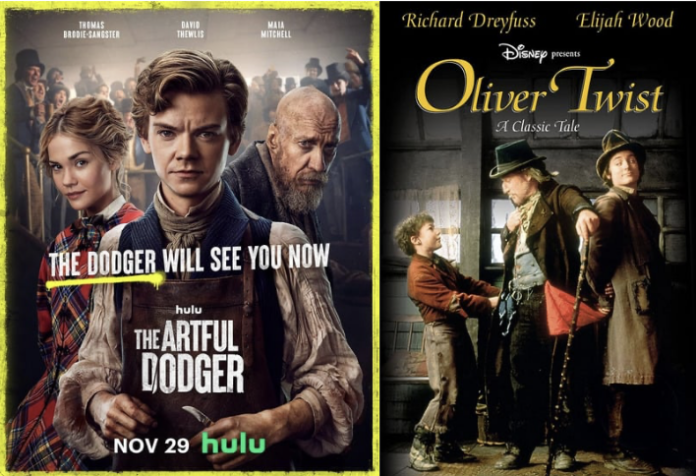Despite their difference in character portrayal, both stories leave you contemplating social issues like abuse and gender inequalities
By LORENA ALVAREZ — arts@theaggie.org
There is a lot of debate about what is better: novels or their adaptations. Many strongly stress that adaptations fall short of their counterparts. While it may seem absurd that cinematic adaptations can do novels justice, it is possible. Hulu’s “The Artful Dodger” is an example, showing what it means to take a classic novel and adapt it to modern demands, making it new.
For those who have not seen it, the show is a sequel to Charles Dickens’ “Oliver Twist.” Dickens’ novel follows Oliver Twist, an orphan, who is abused and taken advantage of by his elders. As the child is forced to be an accomplice to thievery, Twist experiences immense fear and pain as he worries about disappointing those who care for him. In the end, it is revealed that Twist is an heir to a great fortune and will assumedly no longer live such a difficult and dangerous life.
Hulu’s sequel follows Dodger’s attempts to stray away from thievery and deceit all while entertaining modern viewers with the chemistry between Dodger and Lady Belle Fox. Despite the humor and romance, the first season does not do Dickens’ characters justice.
The novel illustrates the physical pain Twist endures at the hand of adults like Fagin, a thief who misguides children into crime. In doing this, Dickens’ emphasizes Twist’s innocence.
Fagin plays a big role in the text as he taunts Twist and his beloved book collection. Twist’s goodness is emphasized as he implores Fagin to return the books Oliver had borrowed from Mr. Brownlow, the kind man who saved him from an abusive apprenticeship.
His willingness to give up his freedom and be one of Fagin’s pawns characterizes Twist as a boy who wants nothing more than to remain good in the eyes of the people who treat him with kindness.
Rather than depicting Twist as one of Fagin’s victims like the sequel illustrates Dodger, the show conveys Twist as a snobby man who has succumbed to a life of thievery. The plot twist that Twist, a man who passes as a gentleman, has stolen the gold before Dodger has had the chance completely changes Twist’s characterization as an innocent child who is taken advantage of.
In depicting Twist as someone who is more than willing to expose Dodger and illustrating him as a deceitful man, the series abandons the novel’s value of innocence.
Twist is characterized as a cruel and daunting man as he taunts Dodger, reminding him that he can end his career as a surgeon in any moment by simply revealing Dodger’s past as a thief.
“I have to speak a truth I can no longer hold inside,” Twist said in episode 7 of the show. “it has only been a day or so, but I must speak the truth.”
In drawing out the truth he “needs” to speak, the performance conveys Twist as someone who gets pleasure out of making others uneasy, a villain.
Despite their characterization differences, both the book and the series critique social inequities. While the novel follows a young orphan’s hardships and attempts to remain moral, the show illustrates two surgeons’ journeys through unique obstacles. Through Dodger’s attempts to be moral, the show explores how easy it is to be influenced into wrongdoing and the difficulty in breaking gender boundaries.
This difference in social commentary allocates “The Artful Dodger” its success despite its villainization of Twist. In centering the plot around Dodger and Lady Belle Fox’s chemistry and breaking gender norms through Lady Belle Fox, the series has catered the adaptation to today’s viewers.
Written by: Lorena Alvarez — arts@theaggie.org



